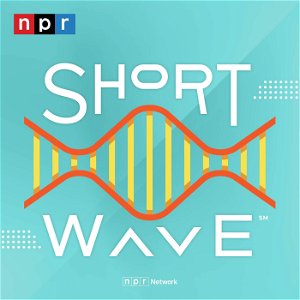
Wildlife trafficking is one of the largest and most profitable crime sectors in the world. The illegal trade estimated to be a multi-billion dollar industry. On a high level, that illegal trade causes problems for everything from global biodiversity to local economies and the balance of entire ecosystems. And on the immediate level, authorities are tasked with caring for confiscated animals and placing them in long-term care facilities. One network launched last year by the U.S. Fish and Wildlife Service and the Association for Zoos and Aquariums hopes to help. And with wildlife trafficking surging globally, the organizations are now in talks to expand the program to other parts of the country. Read more about illegal wildlife trafficking and check out more photos in climate correspondent Nate Rott's full story. Have other wildlife stories you want us to cover? Email us at shortwave@npr.org. Learn more about sponsor message choices: podcastchoices.com/adchoices NPR Privacy Policy

Kyne Santos was a student at the University of Waterloo when she began her math and her drag careers. She compares her double life to Hannah Montana, doing math equations at school by day and drag at night. You may already know Kyne from TikTok, where she makes educational videos about math, science, history and drag. And now, in her new book Math in Drag, Kyne explores the connections between math and drag: How both can be creative, beautiful and most of all, fun. Want to hear us cover more math? Email us at shortwave@npr.org. Learn more about sponsor message choices: podcastchoices.com/adchoices NPR Privacy Policy

June 6, 1944 the Allied Forces stormed the beaches of Normandy and took the Nazis by surprise in the largest sea-to-land invasion in history. This would be remembered as D-Day and would ultimately lead to the end of World War II in Europe. However, this planned attack wouldn't have been possible without deep knowledge of ocean tides! We get into the whole story, including why tides sit at the intersection of astronomy and marine ecology — and why understanding tides are key to a greener future.Want to hear us cover more science history? Email us at shortwave@npr.org.

People with post-traumatic stress disorder (PTSD) may soon have a new treatment option: MDMA, the chemical found in ecstasy. In August, the Food and Drug Administration plans to decide whether MDMA-assisted therapy for PTSD will be approved for market based on years of research. But serious allegations of research misconduct may derail the approval timeline. NPR science reporter Will Stone talks to host Emily Kwong about the clinical trials on MDMA-assisted therapy research and a recent report questioning the validity of the results. Read Will's full story here. Learn more about sponsor message choices: podcastchoices.com/adchoices NPR Privacy Policy

A silky shark named Genie traveled from the Galapagos Islands out to the open ocean and back – over 17,000 miles – over the course of a year and a half. That's an average of 31 miles per day, making Genie's journey the longest recorded migration for a silky shark. Marine scientist Pelayo Salinas de León and his team named Genie in honor of the late marine biologist Eugenie Clark – also known as "The Shark Lady." She devoted her life to the study of sharks and to improving their reputation. Have another story you want us to cover? Email us at shortwave@npr.org. Learn more about sponsor message choices: podcastchoices.com/adchoices NPR Privacy Policy

Humans rely on our symbiotic relationship with good microbes—in the gut, the skin and ... the vagina. Fatima Aysha Hussain studies what makes a healthy vaginal microbiome. She talks to host Emily Kwong about her long-term transplant study that asks the question: Can one vagina help another through a microbe donation? Have a human body question? Email us at shortwave@npr.org. Learn more about sponsor message choices: podcastchoices.com/adchoices NPR Privacy Policy

Each year 84,000 people in the U.S. are diagnosed with melanoma. About 90% of these skin cancers are linked to the ultraviolet radiation from the sun. Sunscreen does protect the skin, but dermatologists have found six very common mistakes people make when it comes to using it. NPR science correspondent Allison Aubrey talks to host Regina G. Barber about the science behind sunscreen and how to avoid making these mistakes this summer. They also get into which sunscreens may be better than others. Have other science stories you want us to cover? Email us at shortwave@npr.org. Learn more about sponsor message choices: podcastchoices.com/adchoices NPR Privacy Policy

Fibroids are benign uterine tumors. So why does it matter that the majority of people with a uterus will have one before they are 50 years old? Physician Rachell Bervell, founder of the Black OBGYN Project, explains that when symptoms arise, they can be quite serious — from extreme menstrual bleeding to fertility problems. Plus, why they're very likely to affect you or a loved one. Curious about other health issues? Email us at shortwave@npr.org. Learn more about sponsor message choices: podcastchoices.com/adchoices NPR Privacy Policy

Scientists are testing the limits of artificial intelligence when it comes to language learning. One recent challenge? Learning ... whale! Researchers are using machine learning to analyze and decode whale sounds — and it's just as complicated as it seems. Curious about other mysteries of nature? Email us at shortwave@npr.org. Learn more about sponsor message choices: podcastchoices.com/adchoices NPR Privacy Policy

Baobabs are sometimes called the "tree of life" with their thick trunks, crown of branches and flowers that only open at twilight. But theories about their geographic origin was divided among three places: the savannas of sub-Saharan Africa, the Kimberley region of western Australia and the dry forests of the island nation of Madagascar. To solve this mystery, a global research team led by scientists at the Wuhan Botanical Garden at the Chinese Academy of Sciences examined high-quality genomic data from all eight baobab species. Have another origin story you want us to cover? Email us at shortwave@npr.org.

Chocolate may never be the same. The majority of chocolate is made in just two countries and erratic weather from climate change is decreasing cocoa production. A handful of extreme weather events—from drought to heavy rainfall—could have lasting effects on the chocolate industry. Yasmin Tayag, a food, health and science writer at The Atlantic, talks to host Emily Kwong about the cocoa shortage: What's causing it, how it's linked to poor farming conditions and potential solutions. Plus, they enjoy a chocolate alternative taste test. Read Yasmin's full article. Have a food science story you want us to cover? Email us at shortwave@npr.org. Learn more about sponsor message choices: podcastchoices.com/adchoices NPR Privacy Policy

As artificial intelligence seeps into some realms of society, it rushes into others. One area it's making a big difference is protein science — as in the "building blocks of life," proteins! Producer Berly McCoy talks to host Emily Kwong about the newest advance in protein science: AlphaFold3, an AI program from Google DeepMind. Plus, they talk about the wider field of AI protein science and why researchers hope it will solve a range of problems, from disease to the climate. Have other aspects of AI you want us to cover? Email us at shortwave@npr.org. Learn more about sponsor message choices: podcastchoices.com/adchoices NPR Privacy Policy
Saatavilla
Arvostelut

Arvostelut
Arvostele tämä nimike ensimmäisenä